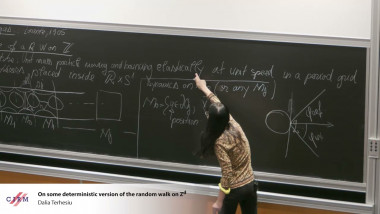
On some deterministic version of the random walk on $\mathbb{Z}^d$
De Dalia Terhesiu
Apparaît dans la collection : Interacting particle systems and related fields / Systèmes de particules en interaction et domaines connexes
The Directed Polymer in a Random Environment is obtained by weighting the trajectories of finite length simple random walk using an i.i.d. random environment. It is one of the simplest disordered models in statistical mechanics, and one for which the disorder-induced phase transition has been intensively studied. When the intensity of the disorder increases, the systems behavior changes drastically: at high temperature (low disorder intensity) the trajectories of the polymer are diffusive with a behavior which is very similar to that of the simple random walk, at low temperature, the trajectories of the polymer are conjecture to concentrate on a narrow space-time corridor, and its end-point distribution is localized. In this talk we will survey recent results obtained in collaboration with S. Junk concerning the sharpness and smoothness of this transition.
